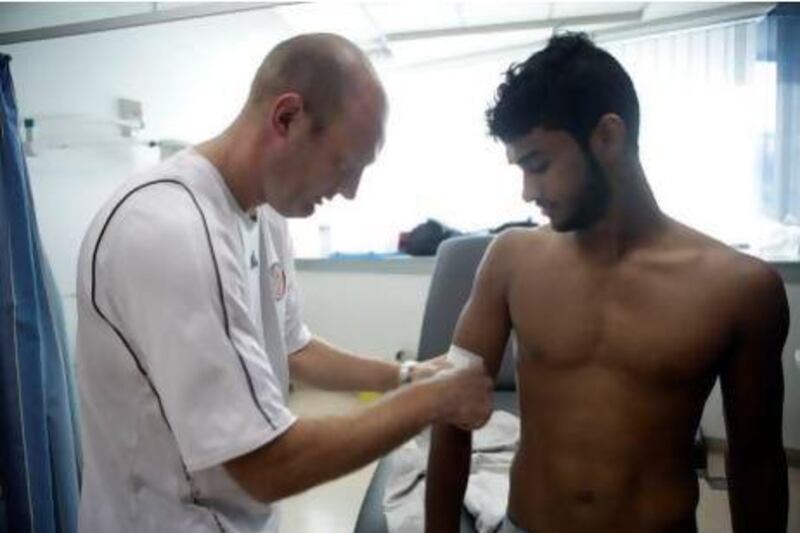If a sportsman fails a dope test, the buck stops immediately with them.
The UAE National Anti-Doping Code reads: "Every athlete, as part of his personal obligation, shall guarantee that no prohibited substance enter into his body."
The governing body for that sport, or the clubs to which they are affiliated, have zero accountability.
All of which is totally unambiguous - but seems a touch unlikely. And it goes against recent evidence in UAE football, too.
When three Sharjah footballers returned positive dope tests last year, each was banned for three months.
And yet the team masseur, who the anti-doping commission accepted had provided the three with the energy drink which led to the failed test, was suspended for nine months.
Those bans are telling. It implies that the fault of the players was minimal, that the member of staff should have known better - but that no one involved really wanted to cheat. If that were the case, the ban should have been for two years.
If football attracts around 95 per cent of all funding spent on sport in the UAE, as was estimated last year by an official from the governing body of a different sport, presumably it has the resources to police doping better than anyone else.
So what does the sport do to prevent and educate?
Education
According to Nick Worth, the medical services director at Al Jazira, education on doping in football here is minimal, and mostly left to the clubs to handle.
Jazira require their players to sign a document once per year saying they will not take any medication unless it is checked by the club doctor, the medical services director or the physiotherapy team.
Sounds obvious, but Worth points out there are plenty of reasons a player might be prescribed something by an outside source.
"If you go to a doctor here in UAE with a cold, they won't just prescribe a couple of paracetamol and rest," he said.
"You will get antihistamines, decongestants, a cough syrup, cough tablets and all sorts. That is the problem.
"They get five of these potions. You look at them and four have banned stimulants in them. There is an element of trust, and I would like to think the players would bring [the drugs] in to us."
The procedure
As a member of the Asian Football Confederation (AFC), the UAE Pro League is obliged to adhere to all Fifa regulations – and thus to the World Anti-Doping Authority Code.
As such, the players are tested in the same way as in every major league in the world.
The teams are subjected to random tests approximately 10 times per season.
Typically, at around half time the shirt numbers of three players will be picked by the testers.
At the end of the match, those players are informed and undergo urine tests. Two players are picked, with one reserve in case one of those chosen has suffered injury and had to go to hospital, for example.
Nutritional regime
Nutrition and fitness experts employed by clubs in the UAE despair of what constitutes a diet for many of their players.
Many are more likely to consume a Double Whopper or a Zinger Burger than they are a performance enhancing substance.
If the country's supply of Big Macs were ever to be contaminated with clenbuterol – as reportedly happened with some meat at international tournaments in Mexico and China recently – the anti-doping headquarters would go into meltdown. "You try to encourage them not to [eat fast food], but they are their own people. I know they do," Worth said.
Jazira's players are made aware of a preferred match-day menu. One part of that, for example, is a cereal bar eaten 15 minutes before kick-off.
The current bar of choice contains 141 milligrams of caffeine – or the equivalent of around five cups of coffee. That may seem high, but it is still well below football's legal limit for caffeine.
The team orders only batch-tested supplements, energy bars and recovery shakes - meaning the manufacturers certify the products have not been contaminated with any banned substances.
Biological profiles
With a relatively low return of positive tests, in comparison to individual sports, in particular, football does not appear to be overly afflicted by a doping problem. As such, the methods used to monitor it are not especially sophisticated.
There is no such thing here, for example, as the biological passports cyclists carry to record biological markers of doping.
Blood tests are rare, other than for the annual medical check-ups.
The players do have medical passports, as per AFC rules, but that concerns general health, not doping.
Follow us
[ @SprtNationalUAE ]






